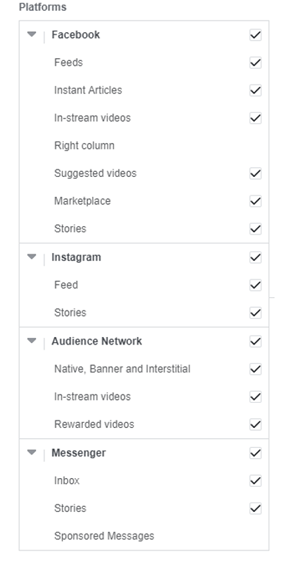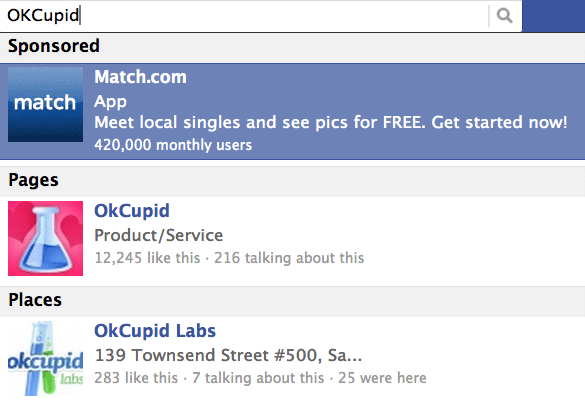How Facebook is Gunning for Google’s Ad Revenue
Facebook announced in December 2018 that it was testing search ads in its Facebook Ads search results and Marketplace. It is the first time since 2012 that Facebook has tested search ads: back in 2012 it briefly tested sponsored results. The first thought of marketers and journalists when they heard about it was: ‘Facebook is gunning for Google’s ad revenue’.
Bad news for Google, but what does this mean for us? In this blog post, I aim to explain in clearer terms what the search ads are, who is currently running them, why Facebook is testing them, and how they will impact advertisers.
The search ad is a text-only version of a news feed ad, and advertisers must already be running image or carousel ads in the news feed before they can run search ads. Advertisers cannot target keywords or phrases; instead they choose to run search ads by selecting Search as a platform in addition to Facebook. Lastly, the search ads can only run on mobile.

Facebook has not shared an example of what the ads look like, but we can guess that they will be like the sponsored results in 2012. This is because Facebook specified that the ads will have a sponsored tag, which we know the sponsored results also had. However, we do not know whether the search ads will show above the organic search results as the sponsored results did, below, or interspersed. Lastly, search ads in the search results can appear only on Android.

For what the search ads might look like in the Marketplace, imagine the Match.com sponsored result appearing instead of Jasper’s Market image ad in Facebook’s example below. Search ads in the Marketplace can appear on both iOS and Android.

Who Is Participating in the Test
Facebook has selected a small group of advertisers from the automotive, eCommerce and retail industries in the US and Canada to participate in the test. These advertisers get to choose a placement and run a search ad there free of charge, for now.
Why Facebook Is Running the Test
While Facebook has increased its advertising revenue year on year for at least the past 4 years, its revenue growth has been slowing down as it runs out of advertising space on the News Feed. Looking for new sources of revenue, Facebook has previously started to monetise Instagram, turning it from a purely social platform where you could keep up to date with what your friends are doing to a content platform and marketplace where people who want to shop and be entertained hang out. In line with this direction, Facebook introduced the Stories platform on both Facebook and Instagram. Search is another platform that Facebook might introduce, depending on the outcome of the test.
How It Impacts Advertisers
Short term impact while the search ads are in beta and exclusive to a small group of advertisers
Facebook might expand the test to include a group of advertisers in the UK. If your competitor is one of those advertisers, it will give them a chance to increase their visibility on Facebook and, more importantly, not only be the only advertisers present in search results unrelated to their own Facebook page, but also potentially appear in search results related to your Facebook page. This may reduce the visibility and click-through rate of your own ads, especially if the search ads show above the organic search results.
Short term impact for early birds once the search ads are available to all advertisers
Unlike on Google, users cannot opt out of seeing ads, and can only hide them temporarily and on an ad by ad basis. While this might mean that our Facebook searchers pay less attention to search ads and may even be more annoyed at seeing search ads, Facebook users tend to be younger and to have never known a time when search results on the Internet were free of ads. Moreover, just because Google searchers can opt out of seeing ads does not mean that they bother or know how to do so. Indeed, search ads on Facebook might get more engagement and might cost less than search ads on Google, not least because for the first year at least it will be a new platform with much fewer advertisers than in the Google ad auction.
Long term impact once the search ads are available to all advertisers
Unlike the sponsored results from 2012, which only allowed advertisers to direct users to their app, page, custom page tab, or post, the new search ads on Facebook might direct users out of Facebook and to the advertiser’s website. This scenario seems likely because whereas the sponsored results were tested in the search results, the new search ads are being tested in not only the search results but also the Marketplace. If this is the case, the new search ads will be more effective at driving website traffic than the sponsored results and therefore useful for advertisers with traffic goals.
By venturing into search advertising, Facebook would reduce Google’s dominance in the search engine market, which in the UK was 89% in 2018. Though Facebook is unlikely to challenge Google’s for the position of market leader, it could eventually have a greater share of the search market than Bing, which is the second largest search engine in the UK in terms of market share at 7%. Seeing that this percentage is already making it worthwhile for some advertisers to advertise on both Google and Bing, it would be wise for search advertisers to consider advertising on Facebook as well as Google if search ads do become available to all advertisers. At ThoughtShift, we are experienced in creating and delivering an integrated digital marketing strategy that includes social advertising on Facebook as well as Google and other marketing channels so we are well placed to adapt to this change in the search engine market. B2C advertisers who do not adapt however, may find that by exclusively advertising on Google they see their ad impressions decrease as users turn to Facebook to conduct their searches rather than Google.
Follow my contributions to the blog to find out more about Facebook and Google advertising, or sign up to the ThoughtShift Guest List, our monthly email, to keep up-to-date on all our blog posts, guides and events.
